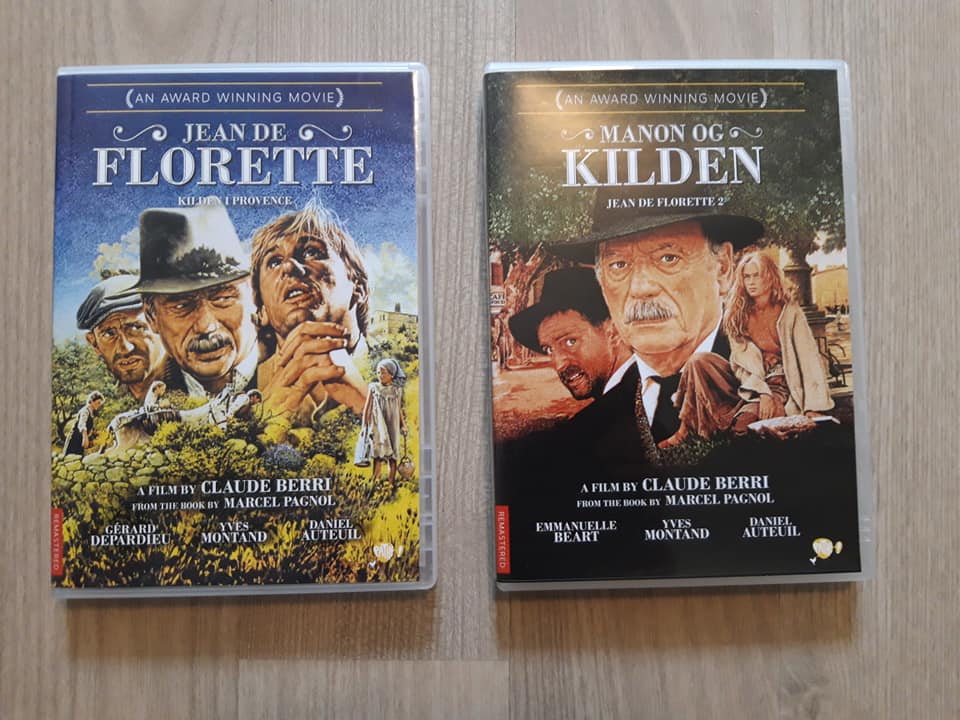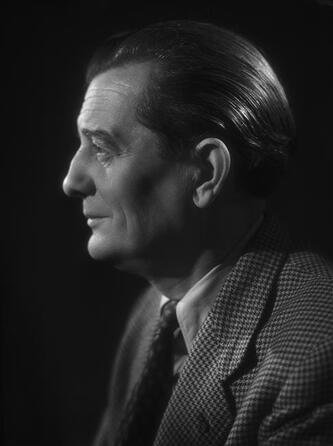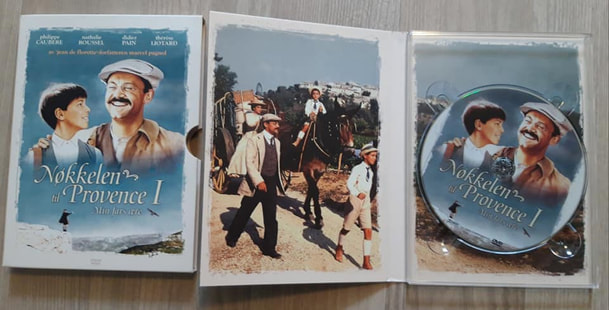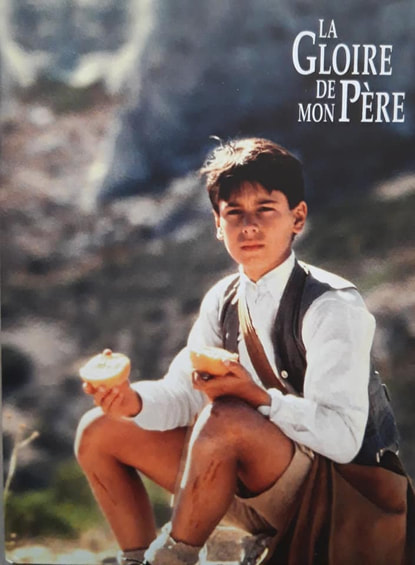|
By Studio Harcourt - RMN, Public Domain, https://commons.wikimedia.org/w/index.php?curid=76212655 Ever since I first discovered some of Marcel Pagnol's books in the shelves of the local library, I have absolutely adored his work and wanted to know as much about him as possible. I have yet not visited his birthplace or walked in his footsteps in Provence, but I will definitly do that the next time I visit. Here and now, I just want to share with you a little bit of what I've learned about him, and introduce you to some of his wonderful novels, which have also been adapted for cinema. If you follow the links, you'll be able to enjoy some of the newest adaptions to film, and once you've watched those, I'm quite sure you'll want to see more, especially if you love everything French and Provence in particular. So let me tell you about ... Marcel Pagnol (28 February 1895 – 18 April 1974): He was a French novelist, playwright, and filmmaker. In 1946, he became the first filmmaker elected to the Académie française. Although his work is less fashionable than it once was, Pagnol is still generally regarded as one of France's greatest 20th-century writers and is notable for the fact that he excelled in almost every medium, - memoir, novel, drama and film. Marcel Pagnol was born on 28 February 1895 in Aubagne, in the Bouches-du-Rhône department, which is situated in the south of France, near Marseille. He was the eldest son of Joseph Pagnol, who was a school teacher, and Augustine Lansot, who was a seamstress. Marcel grew up in Marseille with his younger brothers Paul and René, and his younger sister Germaine. School years According to Wikipedia, the family rented a house in the sleepy Provençal village of La Treille in July 1904. The house was called the Bastide Neuve, and was situated in the hilly countryside between Aubagne and Marseille. The family spent many summers there, and it was a very happy time for Marcel. But about the same time, his mother's health, which had never been robust, began to noticeably decline. Sadly, on 16 June 1910 she died of a chest infection ("mal de poitrine") at the age of only 36. Marcel's father remarried in 1912. In 1913, at the age of 18, Marcel passed his baccalaureate in philosophy and started studying literature at the University in Aix-en-Provence. When World War I broke out, he was called up into the infantry at Nice, but he was discharged in January 1915 because of his poor constitution ("faiblesse de constitution''). On 2 March 1916, he married Simone Colin in Marseille, and in November the same year, he graduated in English. He became an English teacher, teaching in various local colleges and at a lycée in Marseille. Career in Paris In 1922, he moved to Paris, where he taught English until 1927. He then decided to devote his life to playwriting instead. He belonged to a group of young writers during this time, and wrote a play, Merchants of Glory, in collaboration with one of them, a young man called Paul Nivoix. The play was produced in 1924, and was followed by Topaze in 1928, a satire based on ambition. Feeling exiled in Paris, he eventually returned nostalgically to his Provençal roots, and made this his setting for the play Marius. This play later became the first of his works to be adapted into a film in 1931. He separated from Simone Collin in 1926 and formed a relationship with the young English dancer Kitty Murphy, even though he was not divorced from Simone until 1941. His and Kitty's son Jacques Pagnol was born on 24 September, 1930. (Jacques later became his father's assistant and subsequently a cameraman for France 3 Marseille.) Filmmaking career In 1929, on a visit to London, Pagnol attended a screening of one of the first talking films. He was so impressed that he decided to devote his efforts to cinema. He contacted Paramount Picture studios and suggested adapting his play Marius for cinema. This was directed by Alexander Korda and released on 10 October 1931. It became one of the first successful French-language talking films. In 1932 Pagnol founded his own film production studios in the countryside near Marseille. Over the next decade Pagnol produced his own films, taking many different roles in the production – financier, director, script writer, studio head, and foreign-language script translator – and employing the greatest French actors of the period. On 4 April 1946, Pagnol was elected to the Académie française, taking his seat in March 1947, the first filmmaker to receive this honour. Themes of Pagnol's films In his films, Pagnol transfers his playwriting talents onto the big screen. His editing style is somberly reserved, placing emphasis on the content of an image. Pagnol relied on film as an art to convey a deeper meaning, rather than just as a tool to tell a story. Pagnol also took great care in the type of actors he employed, hiring local actors to appear in his films to highlight their unique accents and culture. Like his plays, Pagnol's films emphasize dialogue and musicality. The themes of many of Pagnol's films revolve around the acute observation of social rituals. Using interchangeable symbols and recurring character roles, such as proud fathers and rebellious children, Pagnol illuminates the provincial life of the lower class. Notably, Pagnol also frequently compares women and land, showing that both can be barren or fertile. Above all, Pagnol uses all this to illustrate the importance of human bonds and their renewal. Pagnol as a novelist In 1945, Pagnol remarried, to actress Jacqueline Pagnol. They had two children together, Frédéric (born 1946) and Estelle (born 1949). Estelle died at the age of two. Pagnol was so devastated that he fled the south and returned to live in Paris. He went back to writing plays, but after his next piece was badly received, he decided to change his job once more and began writing a series of autobiographical novels – Souvenirs d'enfance – based on his childhood experiences. In 1957, the first two novels in the series, La Gloire de mon père and Le château de ma mère were published to instant acclaim. On a personal note, I must say that I simply adore the film adaption of these novels! I first borrowed them at the library, but decided that these were films I just had to have my own copy of so I could watch them again and again. So far, I've bought La Gloire de mon père, and as soon as I can get hold of Le chateau de ma mère, I will buy that, too.  My DVD of La Gloire de mon père (top picture: Norwegian title). The third, Le Temps des secrets, was published in 1959, and the fourth, Le Temps des Amours, was to remain unfinished and was not published until 1977, after his death. In the meantime, Pagnol turned to a second series, L'Eau des Collines – Jean de Florette and Manon des Sources, which focused on the machinations of Provençal peasant life at the beginning of the twentieth century, and were published in 1962. Pagnol adapted his own film Manon des Sources, with his wife Jacqueline in the title role, into two novels, Jean de Florette and Manon des Sources, collectively titled L'Eau des Collines. Death Marcel Pagnol died in Paris on 18 April 1974. He is buried in Marseille at the cemetery La Treille, along with his mother, father, brothers, and wife. His boyhood friend, David Magnan (Lili des Bellons in the autobiographies), died at the Second Battle of the Marne in July 1918, and is buried nearby. Translations Pagnol was also known for his translations of Shakespeare (from English) and Virgil (from Latin). For a complete list of all of Marcel Pagnol's work, go here. (Main sources for this article: Wikipedia and YouTube.) Find out more If this made you want to find out more about Marcel Pagnol and his work, you can find lots and lots of film clips and documentaries on YouTube, but as a start, I suggest you listen to this French documentary. Not only will you learn more about Marcel Pagnol, but it's also a great opportunity to practice your French! :) I hope this article was of interest to you. Please share it with someone you think might like it, and of course you're more than welcome to follow my blog for more articles, including the French lifestyle and La Vie Adorable in general! À bientôt!
0 Comments
|
Categories
All
Archive
November 2022
|
Copyright www.elsekosberg.com 2023
CONTACT INFORMATION:
E-mail: [email protected]
Mobile phone: +47-97 64 93 54
IF ALL YOU SEE IS AN EMPTY SCREEN: SCROLL UP TO FIND THE INFO!
HVIS DU KUN SER EN TOM SKJERM: SCROLL OPP FOR Å FINNE INFO!
PRIVACY POLICY



 RSS Feed
RSS Feed